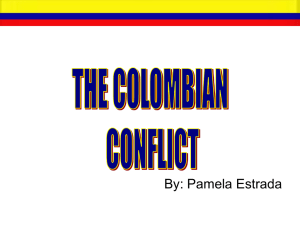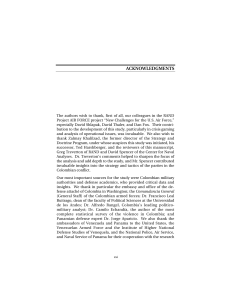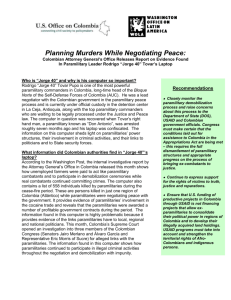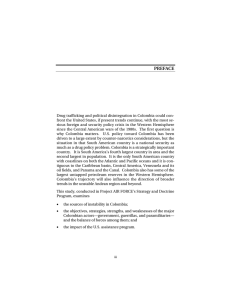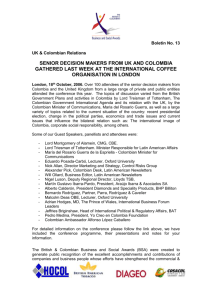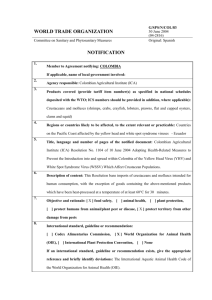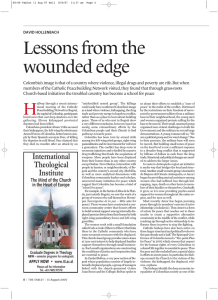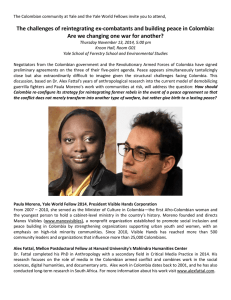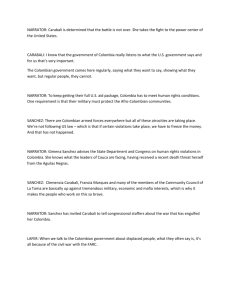THE USES AND ABUSES OF EXTRADITION IN THE WAR ON DRUGS*
advertisement
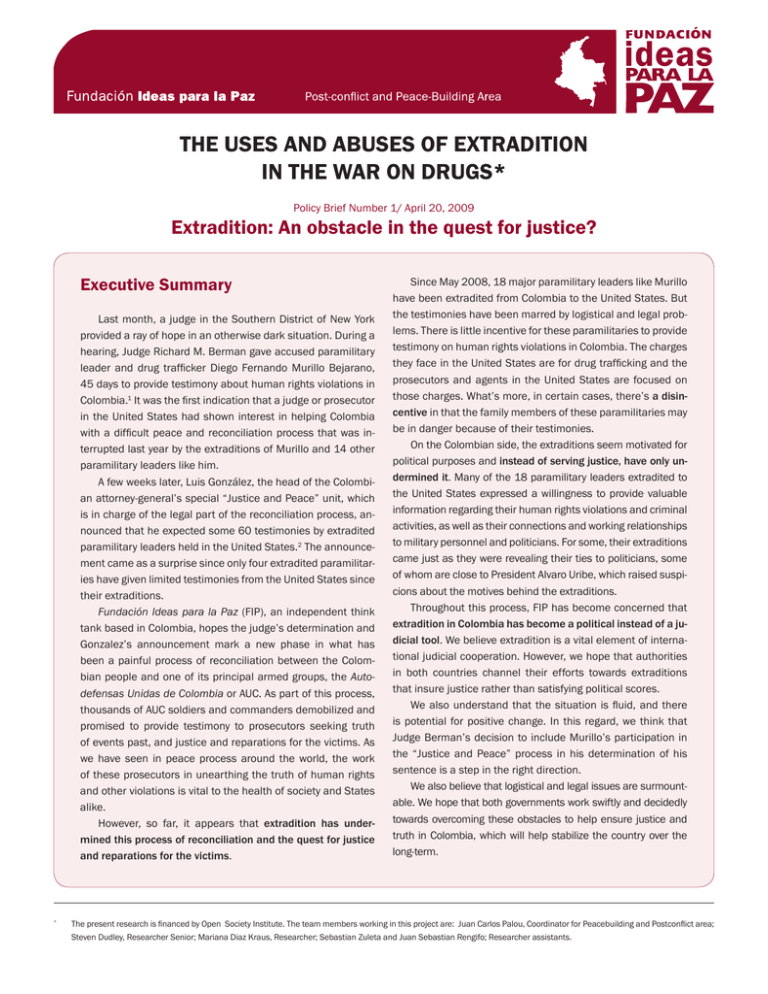
THE USES AND ABUSES OF EXTRADITION IN THE WAR ON DRUGS* Policy Brief Number 1/ April 20, 2009 Extradition: An obstacle in the quest for justice? Executive Summary Last month, a judge in the Southern District of New York provided a ray of hope in an otherwise dark situation. During a hearing, Judge Richard M. Berman gave accused paramilitary leader and drug trafficker Diego Fernando Murillo Bejarano, 45 days to provide testimony about human rights violations in Colombia.1 It was the first indication that a judge or prosecutor in the United States had shown interest in helping Colombia with a difficult peace and reconciliation process that was interrupted last year by the extraditions of Murillo and 14 other paramilitary leaders like him. A few weeks later, Luis González, the head of the Colombian attorney-general’s special “Justice and Peace” unit, which is in charge of the legal part of the reconciliation process, announced that he expected some 60 testimonies by extradited paramilitary leaders held in the United States.2 The announcement came as a surprise since only four extradited paramilitaries have given limited testimonies from the United States since their extraditions. Fundación Ideas para la Paz (FIP), an independent think tank based in Colombia, hopes the judge’s determination and Gonzalez’s announcement mark a new phase in what has been a painful process of reconciliation between the Colombian people and one of its principal armed groups, the Autodefensas Unidas de Colombia or AUC. As part of this process, thousands of AUC soldiers and commanders demobilized and promised to provide testimony to prosecutors seeking truth of events past, and justice and reparations for the victims. As we have seen in peace process around the world, the work of these prosecutors in unearthing the truth of human rights and other violations is vital to the health of society and States alike. However, so far, it appears that extradition has undermined this process of reconciliation and the quest for justice and reparations for the victims. * Since May 2008, 18 major paramilitary leaders like Murillo have been extradited from Colombia to the United States. But the testimonies have been marred by logistical and legal problems. There is little incentive for these paramilitaries to provide testimony on human rights violations in Colombia. The charges they face in the United States are for drug trafficking and the prosecutors and agents in the United States are focused on those charges. What’s more, in certain cases, there’s a disincentive in that the family members of these paramilitaries may be in danger because of their testimonies. On the Colombian side, the extraditions seem motivated for political purposes and instead of serving justice, have only undermined it. Many of the 18 paramilitary leaders extradited to the United States expressed a willingness to provide valuable information regarding their human rights violations and criminal activities, as well as their connections and working relationships to military personnel and politicians. For some, their extraditions came just as they were revealing their ties to politicians, some of whom are close to President Alvaro Uribe, which raised suspicions about the motives behind the extraditions. Throughout this process, FIP has become concerned that extradition in Colombia has become a political instead of a judicial tool. We believe extradition is a vital element of international judicial cooperation. However, we hope that authorities in both countries channel their efforts towards extraditions that insure justice rather than satisfying political scores. We also understand that the situation is fluid, and there is potential for positive change. In this regard, we think that Judge Berman’s decision to include Murillo’s participation in the “Justice and Peace” process in his determination of his sentence is a step in the right direction. We also believe that logistical and legal issues are surmountable. We hope that both governments work swiftly and decidedly towards overcoming these obstacles to help ensure justice and truth in Colombia, which will help stabilize the country over the long-term. The present research is financed by Open Society Institute. The team members working in this project are: Juan Carlos Palou, Coordinator for Peacebuilding and Postconflict area; Steven Dudley, Researcher Senior; Mariana Diaz Kraus, Researcher; Sebastian Zuleta and Juan Sebastian Rengifo; Researcher assistants. Unidad de análisis • www.ideaspaz.org/publicaciones • 2 Background On May 13, 2008, Colombian authorities rounded up 14 the most powerful paramilitary leaders from their jail cells in Colombia and handed them to United States authorities to be extradited to the US where they face drug trafficking and other criminal charges. It was a controversial decision. The extraditions removed the key players in the peace and reconciliation process, many of whom had committed thousands of criminal acts in Colombia, including the murder of thousands of people and the forcible displacement of hundreds of thousands of others; the stealing hundreds of farm animals, millions of acres of land; the forced recruitment of minors; the systematic rape of women; the destruction of private and public property; the theft and corruption of local officials; election fraud and countless other crimes.3 The move came amidst a tumultuous and troubled negotiation process between the Colombian government and the paramilitary umbrella group, known as the Autodefensas Unidas de Colombia (AUC). In the mid-1990s, a loose federation of paramilitary groups had formed the AUC. Many of these groups received support from large landowners, businessmen, drug traffickers and some government forces. They operated as the military’s proxy for years. In the years that followed, the AUC expanded and commanded close to 20,000 soldiers at its peak. It also increased its drug trafficking activities and was eventually added to the State Department’s list of terrorist organizations on September 10, 2001. In 2002, the AUC began negotiating with the Colombian government. The lack of trust between the two sides was evident from the beginning. The paramilitary side seemed to be manipulating the process, attempting to integrate known drug traffickers into their ranks during the talks, trying to avoid stiff sentences in Colombia and trying to negotiate stays of extradition. The government’s response toward the integration of drug traffickers into the paramilitary ranks was uneven as it allowed some entry and barred others. What’s more, the government also used extradition as a tool to keep the paramilitary leaders at the negotiating table. However, just as paramilitary leaders’ testimony became uncomfortable for the presidency, they were extradited. A Chaotic Peace Process The inability to control the paramilitaries typified the chaotic peace process and certainly precipitated their extraditions. Beginning in 2004, the paramilitary leaders negotiated from a small swath of territory in the northern part of the country that the government demilitarized. But when reports surfaced that the paramilitaries continued to operate their drug trafficking and criminal enterprises from that territory, the government incarcerated them in a make-shift jail near Medellin, Colombia.4 When reports continued to surface about the paramilitaries’ criminal activities, the government moved them to long-established prisons throughout the country. At the same time, new paramilitary leaders began appearing on the list of negotiators and participants in the decades-long fight against the guerrillas. Some of them were well known drug traffickers, including Juan Carlos Sierra, alias “El Tuso,” and Víctor and Miguel Mejía, alias “Los Mellizos.” The government’s policy towards these newly minted paramilitary leaders was inconsistent. In some cases, such as Juan Carlos Sierra and Miguel Mejía, it permitted them to enter into the negotiation process. But in others, such as Miguel Mejía’s twin brother, Víctor, the government denied them access. The government’s incoherent position confused observers and did little to clarify whether it would shield participants of the peace process from extradition requests the United States had already made for many of these new paramilitaries. To be sure, the Colombian government seemed to be improvising. The so-called “Justice and Peace” law governing the process only passed in 2005, and, while it established the basic ground rules for the negotiation process, it was unclear in several respects. First, the law did not delineate who had the final word on who was included in the peace process and who would be excluded. Second, the law did not address the question of possible extraditions directly but opened the door for them by including a clause that stated that the paramilitaries could serve their time in jails outside of Colombia.5 However, while it had its flaws, the “Justice and Peace” law also laid a workable foundation for the peace process, especially after Colombia’s Constitutional Court shored up some of its more obvious loopholes and troubled provisions.6 One of the most important provisions called for “open testimonies,” in which paramilitaries would testify to prosecutors about their criminal acts, their accomplices and their extensive reach in the government. The problem came during the implementation. The willingness of these paramilitary leaders to actually participate in the peace process varied widely, and many paramilitary leaders continued to control their criminal organizations from jail.7 Some demobilized with their troops soon after the process began. Others waited years or started new criminal organizations that were threatening the security of the country. Some “open testimonies” could be corroborated and helped the prosecutors unearth the truth about massacres, political corruption, and military complicity. Other paramilitaries obstructed justice officials’ efforts to determine the truth of theirs and others’ actions. At the same time, these paramilitary leaders appeared to be using information to try and blackmail the president, especially as it pertained to a parallel investigation by the Supreme Court regarding politicians’ connections with the paramilitary groups.8 This parallel investigation further complicated the situation. The Supreme Court of Colombia began investigation in 2005, after a senator filed a petition to investigate claims that the paramilitaries had infiltrated congress. Dozens of politicians were eventually implicated and many jailed, including senators, congressmen, Unidad de análisis • www.ideaspaz.org/publicaciones • 3 mayors and governors of states. The investigations also implicated many of President Alvaro Uribe’s closest allies, including his cousin Mario Uribe, a Senator from the Antioquia province, who was jailed in April 2008. The Specter of Extradition Throughout, the specter of extradition loomed. These paramilitary leaders were wanted for drug trafficking and money laundering in the United States, and extradition requests had been made for many of them. At first, the US government tried to give the Colombian government room to negotiate, even steering their investigative agents away from cases involving paramilitaries.10 It was not official policy, but it was made clear in meetings in the embassy that the agents were not to pursue new cases. However, this unofficial policy ended some 18 months after the process began. “Once they saw the AUC playing games, they backed away from that message,” one US federal agent told FIP.11 Far from separate extradition from the peace process, the Colombian government used the threat as a bargaining chip, offering stays of extradition for those who participated in the peace process and did not commit criminal acts after the process was formally launched in 2004.12 The message was implicit rather than formalized in the peace process. “Extradition is not part of the negotiation process,” the government said in a statement in April 2004. “Whoever would like to avoid it should show the international community their good faith and effort to repent.”13 Extradition was also a source of tension within the AUC. In April 2004, a paramilitary unit ambushed and killed the former commander of the AUC, Carlos Castaño. Beginning in 2001, Castaño had argued that the AUC needed to negotiate simultaneously with the governments of Colombia and the United States.14 The AUC, in Castaño’s view and many others’, had become a virtual cartel in and of itself, as evidenced by Castano’s own indictment in 2002 by the United States government. Castaño had also previously encouraged other drug traffickers to negotiate with the United States, and he believed that he would have to eventually negotiate himself. His position, however, weakened over time, as many paramilitary leaders and their drug trafficking partners saw the peace process as a way to escape prosecution in the US.15 Castaño was killed as he contemplated handing himself into US authorities.16 A Legal Challenge The Colombian government was justifiably frustrated with the paramilitaries and fearful of their continued criminal activities. And as evidence emerged that some paramilitary leaders were rearming their troops, the government decided to act by preparing the extradition of Carlos Mario Jiménez Naranjo, alias Macaco, one of the principal aggressors. But while there was ample evidence to extradite Jiménez, there was also sufficient reason to keep him in Colombia. Jiménez had committed thousands of crimes, including ordering the massacre of hundreds of Colombians, none of which had been clarified yet by his limited “open testimonies.” At the same time, the Supreme Court’s investigations into corrupt politicians required the continued participation of paramilitary leaders like Jiménez who had worked closely with politicians during his time as a paramilitary warlord. In other words, his extradition would remove a key witness in that ongoing process. Fearing Jiménez’s extradition would end their chance to obtain truth and reparations promised in the “Justice and Peace” law, the National Movement of the Victims of State Crimes filed an injunction to an Appellate Court (Juridicatura) in the province of Cudinamarca arguing against the extradition. The injunction, filed in the name of a victim, said Jiménez’s extradition violated the rights of “truth, justice and reparation” promised by the “Justice and Peace” law.17 It added that “crimes against humanity are more grave than drug trafficking.”18 The legal maneuver struck at the core of the issue. And in this matter, the Cudinamarca Appellate Court found in favor of the victims, declaring flatly that it did not understand the executive branch’s “motives as to why it gave precedence to the drug trafficking charges when nothing had been done to investigate and sanction terrible deeds committed in our country, which not only generated massive displacement, massacres, genocides, misery, blood, abandonment, but also the loss of credibility of the institutions, especially the administration of justice and individual rights, whose foundation is securing human dignity.”19 The government, however, appealed, arguing that “extradition involved in the process for which Law 975 of 2005 (‘Justice and Peace’) exists, does not imply they will be excluded from the process, nor does it stop the investigations that need to happen because the Colombian justice system does not lose competence to continue its current actions and the State that receives the extradited [subject] is obligated to collaborate.”20 The government added that government investigators would “go to the prison, where Carlos Mario Jiménez Naranjo is being held, to push forward the investigations to guarantee the victims their right to truth, justice and reparation with the process of Justice and Peace.”21 The Superior Appellate Court agreed and found in favor of the government stating simply that “extradition and the proposals of Justice and Peace are not mutually exclusive.”22 The next day, May 7, 2008, President Uribe extradited Jiménez to Washington D.C. to face charges of drug trafficking and money laundering. A week later, in an apparent attempt to avoid more possible motions against extradition, the president extradited 14 more paramilitary leaders to the United States. “We can’t have injunctions destroying extradition,” the president said.23 These Unidad de análisis • www.ideaspaz.org/publicaciones • 4 paramilitaries had committed thousands of criminal acts and were also key witnesses in the Supreme Court’s ongoing investigation into Colombian politicians. The Political Impact of the Extraditions The extraditions of these paramilitary leaders raised suspicion that the decision was made for political rather than judicial reasons and angered members of the Supreme Court who were investigating the politicians with ties to the paramilitary groups, as well as several groups representing the paramilitary victims. The Inter-American Commission on Human Rights (IACHR) also issued a statement: “Extradition affects the Colombian State’s obligation to guarantee victims’ rights to truth, justice, and reparations for the crimes committed by the paramilitary groups. The extradition impedes the investigation and prosecution of such grave crimes through the avenues established by the Justice and Peace Law in Colombia and through the Colombian justice system’s regular criminal procedures. It also closes the door to the possibility that victims can participate directly in the search for truth about crimes committed during the conflict, and limits access to reparations for damages that were caused. This action also interferes with efforts to determine links between agents of the State and these paramilitary leaders.”24 The Colombian government moved quickly to calm criticism, saying it had reached an accord with the US government that these paramilitaries would continue providing testimony from the US to clarify their role in human rights violations in Colombia and secure reparations for Colombian victims.25 In addition, Colombia’s foreign minister sent a letter to the IACHR stating that the United States and Colombia had agreed on how to cooperate on judicial matters and reparations.26 The United States also tried to reassure Colombians that the criminal activities of these paramilitary leaders would not go unpunished. In Colombia, Ambassador William Brownfield said the US and Colombia had the same goals: 1) justice for people that have suffered from crimes of various people; 2) maximum sanction possible against the condemned people and sentences according to the legal systems of Colombia and the United States for their past crimes; 3) the maximum reparation that is possible for their victims.27 However, criticism has continued and justifiably so. There is no written accord between the nations on judicial cooperation issues. In addition, the political squabble between the Colombian Supreme Court and President Uribe has intensified, giving more credence to the argument that the president had political and not legal motives when he extradited these leaders. Lastly, as is noted in the next section, the legal ramifications of the decisions have become evident. The Legal Impact of the Extraditions It’s been a nearly year since these extraditions. Three more have followed, including one in which the man extradited was slated to testify against President Uribe’s cousin the next week.28 But so far, there are little results because there’s been so little cooperation between the two countries. Four extradited paramilitary leaders have provided testimony to Colombian authorities, each one via short-circuit television from a US courtroom, and no Colombian prosecutors have visited with Jiménez in his jail cell in the United States.29 Even if all the paramilitaries testified from the United States, these testimonies are imperfect at best, starting with the logistical problems. Victims in Colombia have not been able to pose their questions as they had in Colombia while the paramilitaries testified. Prosecutors have had a difficult time getting coherent responses given the long lapse of time between testimonies. The paramilitaries have not had access to their former underlings to verify responses to questions. There is, however, hope that things may be changing. The most recent paramilitary testimony appeared to have sorted many of these problems. According to a Colombian prosecutor present at the testimony, Guillermo Pérez Alzate, alias “Pablo Sevillano,” gave three days of “open testimony” in Tampa during which victims could pose questions from Colombia. The prosecutor said that he expects many more testimonies in the months to come, adding that the paramilitaries he contacted have expressed a willingness to testify.30 Luis Gonzalez, the head of Colombian Attorney General’s Justice and Peace unit, said recently that he expects 60 “open testimonies” in the coming months. We hope this is true, but when FIP asked a US State Department official about the “60” testimonies to come, he said that Gonzalez was inventing that number.31 Part of this is due to the arduous process involved. The process to secure testimony takes about a month, according to the Colombian prosecutor, and includes bureaucratic hurdles in Colombia and the United States. The prosecutor emphasized that US officials were very cooperative and tried to minimize these hurdles. He added that there were some technical difficulties, but nothing that wouldn’t happen if the transmissions were in Colombia.32 Still, the length of process and the technical difficulties present problems going forward. There are also security issues. In February, Colombia’s Attorney General Mario Iguarán visited with several paramilitary prisoners in the United States who also told him they were willing to continue testifying provided their families had security. The threats against the paramilitaries were real, although their origin is unknown. In October, hitmen killed Vladimir Vanoy, Cuco Vanoy’s son.33 In December, the US Department of Justice sent a letter to Colombian authorities regarding the safety of Salvatore Mancuso stating that “statements provided by Mr. Mancuso may have put both himself and his family members in grave danger.”34 Of equal importance, the paramilitaries seem to have little or no incentive to provide testimony to US or Colombian authorities Unidad de análisis • www.ideaspaz.org/publicaciones • 5 regarding human rights violations or relations with politicians and military personnel in Colombia. The agreements thus far have made explicit that cooperation in “Justice and Peace” will not lead to a reduction in their sentences. In the cases of Ramiro Vanoy and Javier Lindo, the agreements state, “Any information he provides to the Colombian government in this regard shall not provide a basis for a downward departure or reduction of the defendant’s sentence.”35 On the other side of the equation, there is no penalty for not cooperating in “Justice and Peace.” The recent statement by Judge Richard M. Berman in the case of Diego Murillo is hope that some judges and prosecutors understand the importance of these proceedings in Colombia. However, this appears to be an individual initiative on the judge’s part rather than an institutional decision by the Department of Justice to push both judges and prosecutors to weigh continued participation in judicial processes in Colombia in determining the paramilitary leaders’ jail sentences. FIP has learned that there was at least one meeting called by former Attorney General Michael Mukasey with prosecutors in these cases shortly after the extradition of the 15 paramilitary leaders last May. However, FIP does not know the content of the meeting or the message that was conveyed to the prosecutors aside from emphasizing the political and judicial importance of the cases at hand.36 In addition, defense lawyers see little upside from getting their clients to testify to more crimes committed in Colombia.37 Understandably, these lawyers are trying to minimize the sentences in the US only. There is some risk to this myopic approach and therefore some incentive for them to push their clients to give “open testimonies” in “Justice and Peace.” The International Criminal Court in the Hague has hinted that it may seek paramilitaries for crimes against humanity. And the Colombian government insists these paramilitaries are still part of the “Justice and Peace” process, therefore their testimony and time served in the US forms part of their compliance with that process. What’s more, US officials say these men will be deported back to Colombia at the end of their sentences.38 But so far, the defense lawyers seem to be reacting almost exclusively to charges brought against their clients in the US, which focus on clarifying their roles in drug trafficking crimes and not human rights violations or crimes against humanity. The structure and dynamic of the US Justice system is also indirectly undermining the peace process in Colombia. US prosecutors are most concerned with the case at hand, in these cases the charges for trafficking drugs or laundering money. Their efforts to secure testimony regarding criminal acts in Colombia are both “outside of their jurisdiction,” as one prosecutor told FIP, and considered extra work that many do not want to do or do not have time to pursue. “I would be getting out of my lane,” one prosecutor said in regards to seeking information on other crimes. “The only thing I would do on my own would be try and get cooperation to get another indictment.”39 While there exists strict sentencing guidelines for crimes in the United States, the judges have autonomy and discretion with regard to how much they weigh the cooperation of the accused. Judge Berman appears to have determined that he will weigh Murillo’s continued participation in the justice process in Colombia. Other judges have been silent on the matter. Most importantly, the US Department of Justice has not made any concerted effort to differentiate these cases from others in the system or provide guidance on the matter. This means that it’s up to the individual prosecutors, judges and defense lawyers in the case to enter the participation of these paramilitary leaders into the case. This has proven to be a bad formula. No part of these cases seems interested in delving deeply into the criminal pasts of these paramilitary leaders beyond what they need to determine the outcome of the case at hand. The notion that these paramilitaries will participate for “the good of the country” and respond to the urging of government authorities is ingenuous and false. FIP believes that the truth and justice process is as important as a stiff sentence in the United States, but there must be some incentive. The Department of Justice has the tools to give incentives in both directions, including the ability to increase sentences for lack of cooperation or lower sentences for substantial cooperation on these matters. The Human Impact of the Extraditions It is too early to say how many people are affected by these decisions to extradite the paramilitary leaders. But the frustration in Colombia and in some sectors of the United States over these decisions to extradite the top paramilitary leaders to the United States remains palpable. Victims’ and human rights organizations, in particular, are incensed by the seeming disregard for the victims’ rights under Colombia’s constitution and the “Justice and Peace” law. Among other things, the extraditions jeopardized victims’ ability to learn the fate or final resting places of loved ones; the identities of people who aided, abetted or ordered crimes; and the recovery of the land and other assets that paramilitary leaders stole from them. Consider the case of more than one thousand peasant farmers seeking reparations from Diego Murillo and one of his paramilitary clans that operated along the northern coast of Colombia. On June 11, 2008, three hundred of these farmers appeared in the village of Valencia, many of them with their deeds in their hands, hoping to retrieve land that Murillo and his cohorts had stolen from them. But when they arrived, the only government response was to play a taped version of Murillo’s “open testimony” in Colombia from prior to his extradition. When they clamored for access to Murillo, the government representative told them they needed lawyers.40 Ironically, victims in another part of the country had already tried aligning themselves with lawyers, but their injunction to stop Jiménez’s extradition failed. Their next recourse was to appeal directly to Unidad de análisis • www.ideaspaz.org/publicaciones • 6 Judge Berman in the case of Murillo, which appears to have been the impetus of Berman’s decision to consider Murillo’s participation in “Justice and Peace” as part of his sentencing. Murillo, however, has said that he will participate in the process only after his sentencing. Unfortunately, that’s when the incentives to tell the whole truth have been completely removed from the process and there’s little hope that Murillo will be forthcoming at that time. On a positive note, the prosecutor who managed Pérez Alzate´s, alias Pablo Sevillano, testimony said the victims’ access to the paramilitary was remarkable for its honesty and frank exchanges. He described it as a “catharsis” and said the victims were the protagonists during the three days of testimony. We applaud this and would encourage more cathartic exchanges, but results also need to come in the form of reparations, locations of buried loved ones, truth about who committed the violent and criminal acts, and reconstitution of lost properties. Lastly, we would note that the president’s justification for extraditing these criminals has also lost validity over time. While the extraditions eliminated the immediate and most apparent danger of the paramilitaries rearming their troops, they did little to stunt the continued growth of these organizations. Indeed, in the medium term, the sudden disappearance of the paramilitary leaders exacerbated an already tense situation. The result was an uptick by as much as 34 percent in homicides in places like Medellin during 2008, the area that Murillo once controlled.41 Attempts to fill the power vacuum continued through this month, when, in a period of five days, 29 people were assassinated in different places in the city.42 Summary The motivations for the Colombian government’s decisions to extradite 18 paramilitary leaders who were involved in a peace and reconciliation process with the Colombian government may have been sound and legal. Many of the paramilitaries were violating the terms of the agreement. Some continued to operate their criminal enterprises from jail. Others showed little interest in contributing to the process and search for truth. Colombia’s Supreme Court had approved of the extraditions and the appellate courts had waded through a motion to stop the extradition of one the paramilitary leaders. However, by removing the key leaders of these criminal organizations, these extraditions have undermined the peace and reconciliation process. In spite of public statements by both governments, there is not enough cooperation between the Colombian and US justice systems to make it work. The US justice system is too rigid in its focus, and the Colombian government has not shown the political will to pursue these paramilitary leaders’ testimonies abroad. The result has been to now a de facto end to the search for truth, justice and reparations so feared by the victims when these men were extradited. And while many of these para- military leaders may spend more time in jail in the United States than they would have under the “Justice and Peace” law, the victims and Colombian society at large will have a difficult time reconciling their versions of events that led to the death and destruction of their country over decades. Recommendations To the US Government • Freeze Extraditions: Just as the United States government can pressure the Colombian government to extradite, it can also withdraw requests, rescind or freeze them as they pertain to the peace and reconciliation process. It is in the US’ interests to work towards a long-lasting peace in Colombia. A key part of that process is prosecuting guilty parties in Colombia and reaching for the truth about past actions. The experience this past year with extraditions of paramilitary leaders has proven that the most effective way this can occur is to keep the accused in Colombia until they have satisfactorily met the requirements for truth and reparations set out in the “Justice and Peace” law, as revised by Colombia’s Constitutional Court. • Real Incentives: While we understand that there are strict sentencing guidelines that judges must follow, we also know that prosecutors can recommend “downward departures” for “substantial cooperation.” Make part of that cooperation be the paramilitaries’ participation in the “open testimonies” and reparations they provide to the victims. By the same token, the paramilitaries should be penalized for their lack of participation in the peace process in Colombia, as we hope will be the case of Diego Murillo. These recommendations should come from the US Department of Justice so it has a blanket effect on all the cases involving the paramilitary leaders already extradited. • Public Support for the Process: We urge the Department of Justice to take the lead on this matter by issuing a public statement in support of the Colombian peace process. We understand that the judges and prosecutors have a certain amount of autonomy in matters of sentencing, but we think the DOJ has to make clear that truth, justice and reparations are a priority, regardless of where the paramilitaries are jailed. To the Colombian Government • Stays of Extradition: More than any other part of government, Colombia’s executive branch controls the levers of extradition. We think the government should provide stays of extradition for all those participating in the peace process, and even to those that are providing testimony to investigators, regardless of their status under “Justice and Peace.” We understand the need and use of extradition as an international tool of justice. But we believe that these accused criminals are vital in establishing a long-term peace in Colombia through their testi- Unidad de análisis • www.ideaspaz.org/publicaciones • 7 monies. Extradition has made it more difficult for Colombian investigators to pursue testimony. • Weigh the crimes: As Colombia goes through this process of reconciliation, drug trafficking crimes appear to have been given more weight than crimes against humanity. We believe that this order should be reversed, as it was in the Cudinamarca Appellate Court’s decision regarding the motion filed against the extradition of Carlos Mario Jiménez. More than any other branch, this decision lies in the hands of Colombia’s Supreme Court when they weigh the future extradition cases. Future legislation and bilateral accords should also consider this factor when determining the viability of extradition. • Future Legislation: Colombia’s Congress sent mixed messages in its “Justice and Peace” law giving priority to the victims but also opening the way for extraditions. We understand that there have to be tools that permit judicial cooperation. But we argue that it should consider these questions more thoughtfully – especially as it relates to the questions of reparations and crimes against humanity – when drafting future legislation concerning peace processes, and that it considers drafting new legislation in order facilitate this particular peace and reconciliation process. Ibid, p. 21. 22 Ibid, p.49. 23 President Uribe Statement, Casa de Nariño, Bogota, May 14, 2008. “IACHR EXPRESSES CONCERN ABOUT EXTRADITION OF COLOMBIAN PARAMI- 21 24 LITARIES,” Press Release N° 21/08, Inter-American Commission on Human Rights, May 14, 2008. 25 President Uribe Statement, Casa de Nariño, Bogota, May 14, 2008. 26 Letter from the Colombian government to the IACHR, May 14, 2008. 27 Ambassador William Brownfield press conference, US Embassy, Bogota, May 14, 2008. 28 The government had already suspended the extradition of the suspect, AUC lea- 29 In November 2008, six months after his extradition, Salvatore Mancuso gave der Ever Velosa, alias HH, for several months. three-days worth of “open testimony” in Washington D.C. In December, from a courtroom in Washington D.C., Rodrigo Tovar answered the Supreme Court’s questions concerning accused Colombian Congresswoman Karelly Lara. In January, Ramiro Vanoy gave one day of “open testimony” from Miami. And in March, Guillermo Pérez Alzate gave three days of “open testimony” from Tampa. 30 FIP interview with Colombian prosecutor who preferred anonymity. FIP interview with US State Department official who preferred anonymity. 32 FIP interview with Colombian prosecutor who preferred anonymity. 33 “Asesinado uno de los hijos de ‘Cuco’ Vanoy,” El Tiempo, October 20, 2008. 34 31 Letter from the US Department of Justice Criminal Division to Luis Gonzalez Leon, Chief, Justice and Peace. “Re: United States v. Salvatore Mancuso-Gomez,” December 1, 2008. 35 United States District Court, Southern District of Florida, Case 99-06153, p.5. 36 FIP interviews with US official and a defense lawyer with knowledge of the mee- FIP interview with a defense lawyer of two paramilitary leaders who preferred ting, both of whom preferred anonymity. 37 anonymity. 1 “‘Don Berna’ tiene que colaborar y rápido,” Semana, March 6, 2009. 38 FIP interview with US Department of State official who preferred anonymity. 2 “Habrá 60 versiones de ex paramilitares desde Estados Unidos en las próximas 39 FIP interview with US prosecutor who preferred anonymity. semanas,” El Tiempo, March 24, 2009. 40 “La Tierra de Los Castaño,” El Tiempo, June 29, 2008. Estimates vary widely, but there are over at least three million victims of 41 “Arauca, Córdoba, Chocó, Antioquia y Risaralda mantienen aún altas tasas de “29 muertos en cinco días en Medellín; parte de la racha sería por guerra en la 3 homicidios,” El Tiempo, January 6, 2009. paramilitary criminal activities. (“La hoja de ruta de justicia y paz”, El Espectador, October 9, 2005.) 4 “El reino de los desmovilizados,” Semana, March 3, 2006. 5 Article 31, Ley 975, Justicia y Paz. 6 42 ‘Oficina de Envigado,’” El Tiempo, April 8, 2009. The decision included creating penalties for hiding the truth as well as given prosecutors more time to investigate crimes. 7 Statement by Colombian Presidency, Feb. 14, 2008. 8 “El eslabón perdido,” Semana, March 21, 2009. 9 “Cousin of Colombian President Arrested in Death Squad Probe,” Washington Post, April 23, 2008. 10 FIP interview with US federal anti-drug agent who preferred anonymity. Ibid. “Uribe Firma Extradición De Mancuso, Pero Le Pone Tres Condiciones,” El Tiem- Statement, Colombian Presidency, April 27, 2004. Interview with Castaño, September 2001, Database FIP. 11 12 po, December 17, 2004. 13 14 Interview with Castaño, January 2002, Database FIP. Interview with Castaño´s lawyer, Joaquín Pérez, who was administering the han- 15 16 dover, databa January 2002, Database FIP. Also see interview with Vicente Castaño, Semana, May 6, 2005. 17 ARTÍCULO 7. Derecho a la Verdad. La sociedad, y en especial las víctimas, tienen el derecho inalienable, pleno y efectivo de conocer la verdad sobre los delitos cometidos por grupos armados organizados al margen de la ley, y sobre el paradero de las víctimas de secuestro y desaparición forzada. 18 Consejo Superior de la Juridicatura, case Nº 110011102000200801403 01, p.3. 19 Ibid, p.18. Ibid, p.19. 20 © Fundación Ideas para la Paz, 2008 Tel: (57-1) 644 6572 / Fax (57-1) 218 1353 Calle 100 No. 8A-37, Torre A, Oficina 605 www.ideaspaz.org / e-mail: fip@ideaspaz.org
